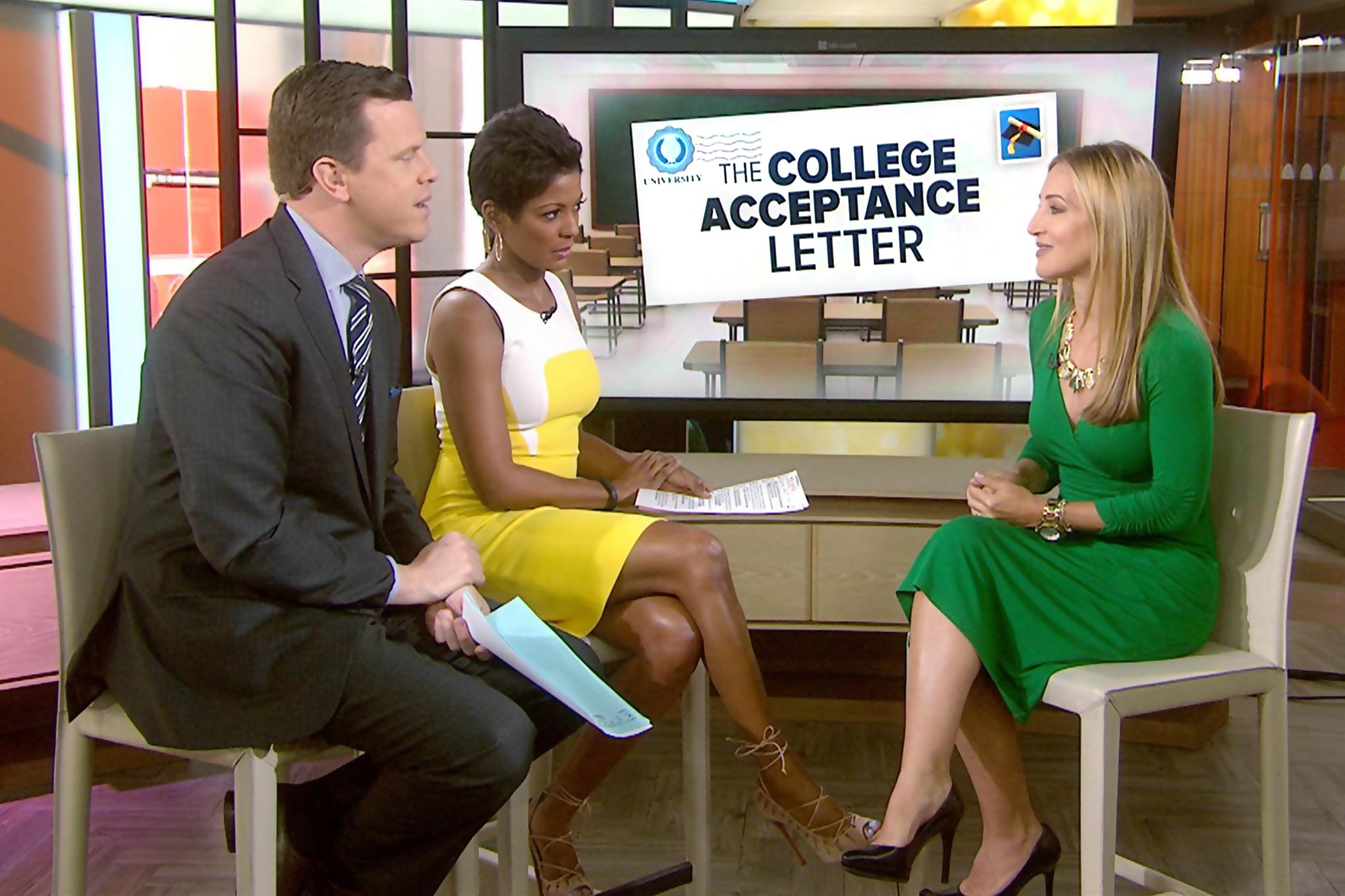IvyWise In The News
IvyWise experts frequently share their education and admissions knowledge with a global audience through regular media appearances and articles.

Recent Media

Considering the Long-Term Impact of Rankings Changes
April 16, 2024

9 Ways to Help Your Teen With the College Decision
March 25, 2024

Vail’s rigorous coursework changes spark debate
March 16, 2024

Has College Admissions Returned to a Normal Level of Crazy?
February 29, 2024

Brown community members reflect on video introduction in admissions
February 26, 2024

How International Students Should Think about Writing, AI
February 24, 2024

6 Key Qualities of Successful MBA Candidates
February 15, 2024

How to Perform Well on SAT, ACT Test Day
February 13, 2024

Dartmouth Will Again Require Standardized Tests
February 10, 2024

48,881 students apply to class of 2028, down 5% from last year
February 5, 2024

How to Prepare for a College Admissions Interview
January 9, 2024

Does volunteering actually matter on college applications?
January 3, 2024

What U.S. College Waitlists Mean for International Students
December 21, 2023

How to Get Into Columbia University: Tips From Real Students and Experts
December 20, 2023

Class of 2028 Admissions Decisions
December 18, 2023

How to Make an “It” College Happen: Inside Vanderbilt’s Hot Streak
December 15, 2023

3 Reasons to Skip Applying to College Early
December 7, 2023

How to Get Into Stanford: 5 Tips From Admitted Students and Experts
November 15, 2023

SAT To Go Fully Digital In 2024
November 15, 2023

Everything You Need to Know About College Rolling Admissions
October 31, 2023

Giant Projects, Big Bucks and an AI Arms Race
October 3, 2023

Common Reasons College Applications Get Rejected
September 12, 2023

What a Minor Is and Why It May (or May Not) Matter
September 11, 2023

Letter of Recommendation Examples for College Applicants
August 21, 2023

The 15 Colleges with the Best Alumni Networks
August 3, 2023

The Hottest College in Boston Is… Northeastern?
August 3, 2023

The Slow Dismantling of College Legacy
July 23, 2023

Most Ivy League Schools Now Have Female Presidents
July 15, 2023

Considering a Catholic University? Here’s What to Know
July 14, 2023

Here’s What Graduate Schools Think About Your College
June 27, 2023

Reporting on College Rankings and Ratings
June 23, 2023

10 College Costs Other Than Tuition and Housing
June 12, 2023

Maximizing Your Chances of Winning Financial Aid
June 11, 2023

How to appeal a financial aid suspension
May 26, 2023

How UAE students can apply to universities abroad
April 24, 2023

How to Find Scholarships for Graduate School
April 25, 2023

What Is a Good GRE Score for Graduate School Admissions?
April 6, 2023

Would GPT-4 Get Into Your College or University?
March 29, 2023

An Inside Look at College Financial Aid Letters
March 26, 2023

Can Your College Admissions Offer Be Revoked?
March 8, 2023

Is This the Best College You’ve Never Heard Of?
February 24, 2023

Is This the Best College You’ve Never Heard Of?
February 24, 2023

How to Perform Well on SAT, ACT Test Day
February 16, 2023

How to Find Private School Scholarships
February 3, 2023

I Edited Mental Illness Out of My College Applications. I’m Not Alone.
December 31, 2022

13 Test Prep Tips for SAT and ACT Takers
November 17, 2022

What to Do While Waiting for College Admission Decisions
October 28, 2022

5 Ways to Get a Tuition Discount
October 28, 2022

How Many Colleges Should I Apply to?
October 10, 2022

What a College Minor Is and Why It Matters
September 22, 2022

The 15 Most Expensive Colleges in the U.S.
September 22, 2022

The 15 Most Expensive Colleges in the U.S.
September 22, 2022

How to Ask for a Letter of Recommendation for College
September 15, 2022

Common Reasons College Applications Get Rejected
September 13, 2022

What You Need to Know About College Tuition Costs
September 13, 2022

Consider Both Liberal Arts Colleges, National Universities
September 8, 2022

The Common App: Everything You Need to Know
September 7, 2022

Is College Admission Subjective Or Objective? What Experts Say
September 6, 2022

Choosing the Right After-school and Extra Curricular Activities
August 29, 2022

A Complete Guide to the College Application Process
August 22, 2022

How Colleges Choose Which Students to Admit
August 16, 2022

What Students Should Know About the GPA Scale
July 22, 2022

The Hottest College in Boston Is… Northeastern?
June 17, 2022

The Hottest College in Boston Is… Northeastern?
June 17, 2022

How to Pay for College Using Overlooked Strategies
May 25, 2022

Waitlisted? Here Are Your Options
May 19, 2022

College Admission Insights
May 2, 2022

Choosing A Business School? Consider The ‘Four C’s’
April 30, 2022

College Counselor discusses National College Decision Day
April 28, 2022

Seeking College-Admissions Edge, More Students Take Gap Year
April 27, 2022

GMAT vs. GRE: Key Differences Between the Tests
April 20, 2022

Navigating the College Waitlist
April 8, 2022

MIT Will Require SAT, ACT Again
April 2, 2022

Why Is It So Hard to Get Into Medical School?
March 30, 2022

Is Graduate School Worth the Cost?
March 29, 2022

How Did the Pandemic Change STEM Careers?
March 14, 2022

How to Decide What Your College Major Should Be
March 8, 2022

Will Scandal Change How People View College Rankings?
February 19, 2022

Paying for Meals at College: What to Know About Costs
February 9, 2022

The SAT is Changing: Here’s What to Know
February 7, 2022

Admissions Consultants Praise College Board’s Shift to Virtual SAT
February 7, 2022

The Impact of COVID-19 on Higher Education
December 29, 2021

6,305 students apply early decision to Columbia
December 15, 2021

How to Understand the Changes in Standardized Testing
December 8, 2021

How to Get into the University of California System
November 5, 2021

Applying to business school? Here’s some advice.
November 1, 2021

Academe Reacts to Convictions in Admissions Trial
October 11, 2021

What’s New on the 2022-2023 FAFSA
October 6, 2021

Is It Time To Ignore College Rankings? Experts Weigh In
September 27, 2021

What You Need to Know About College Tuition Costs
September 17, 2021

A Complete Guide to the College Application Process
September 13, 2021

IvyWise Founder & CEO Dr. Kat Cohen on Weekend Morning News KTLA
September 12, 2021

Where Will Students Apply?
August 9, 2021

The Common App: Everything You Need to Know
August 2, 2021

How to Make a College List
July 23, 2021

21 Places Worth Seeing on College Tours
July 8, 2021

50 Questions to Ask on a College Visit
June 23, 2021

Top Undergrad Majors at the Best Medical Schools
June 4, 2021

20 Best Universities Podcasts of 2021
May 24, 2021

20 Best Process Planning Podcasts of 2021
May 15, 2021

Why the MCAT Is Harder Than a Typical College Exam
May 13, 2021
Tulane Class of 2025 different than any class before it
April 28, 2021
GMAT vs. GRE: Key Differences Between the Tests
April 26, 2021
How to Get Admitted Off a College Waitlist
April 9, 2021
A Great Admissions Year, for Some
April 5, 2021
How to Apply (and Get in) to College During a Pandemic
March 24, 2021
The Unexpected Benefits of Attending a Virtual College Fair
March 16, 2021

GMAT vs. GRE: Which Exam Should You Take?
March 14, 2021
How to Find Admissions Statistics for College
February 25, 2021
Everything You Need to Know About the SATs
February 24, 2021
How to Choose a Med School for Pediatrics
February 22, 2021
These Public Schools Offer an Honors College
February 22, 2021
Weighing Colleges Amid the Pandemic
February 1, 2021
The College Board’s (Smaller?) Future
January 25, 2021
College Board Kills Subject Tests and SAT Essay
January 20, 2021
Want Your Child to Attend a Prestigious International University?
January 19, 2021
The Importance of Executive Functioning Skills Coaching
January 12, 2021
Admissions Have and Have-Nots
January 11, 2021
Benefits of an American Education
December 27, 2020
How to Identify Safety Schools in College Admissions
December 23, 2020
The Best College Admissions Consulting Agencies
December 16, 2020
IvyWise: Get Smart
November 24, 2020
Why Your Kids Need to Prepare for College Before High School
November 24, 2020
What Can You Do With a Psychology Degree?
November 16, 2020
How to Write About Coronavirus in a College Essay
October 21, 2020
How to Apply to College During the Coronavirus Pandemic
September 11, 2020
An Expert’s 5 Tips On Acing College Apps This Fall
September 2, 2020
How College Financial Aid Disbursement Works
August 3, 2020
How Easy Is It to Cheat on the SATs, Anyway?
July 10, 2020
How to Bridge a Financial Aid Gap This Fall
June 1, 2020
Will colleges reopen in the fall?
April 28, 2020
These Public Schools Offer an Honors College
April 23, 2020
10 Costs to Expect When Applying to Medical School
January 28, 2020
De-stressing the College Admissions Process
January 2, 2020
What Students Should Know About SAT Prep Classes
October 25, 2019
How to Find and Secure Scholarships for College
October 10, 2019
3 U.S. College Admissions Mistakes International Students Make
September 26, 2019
An After-School Routine to Help Kids and Parents Beat Homework Stress
September 5, 2019
Wising Up In Ivy’s Education!
August 23, 2019
How to Stand Out When Applying to US Universities: 4 Tips
August 22, 2019
Top 15 L.A. Public High Schools for Hollywood Families
August 18, 2019
How Long Does it Take to Get a PhD Degree?
August 12, 2019
How to Choose the Right Extracurriculars for Your Child
August 2, 2019
What Are Your Chances of Getting Into Med School?
July 18, 2019
What the GMAT Is and How to Prepare for the Test
July 11, 2019
How to Get Into College: 7 Strategies
June 26, 2019
Top Undergrad Majors at the Best Medical Schools
June 14, 2019
What Type of Research Impresses Med Schools?
May 30, 2019
What Graduate Schools Think About Your College
May 23, 2019
What Colleges Look for: 6 Ways to Stand Out
May 22, 2019
Buds of Bilingualism
May 15, 2019

The Best Ways to Appeal College-Aid Offers
April 5, 2019

How to Find Research-Focused Medical Schools
March 29, 2019

College Admissions Fact-Checking
March 24, 2019

Baystate Business: Seafood, ESG, College Admissions (Radio)
March 18, 2019

Here Are 8 Organizations Helping Disadvantaged Students
March 18, 2019

College Cheating Scandal Shines Light on Admissions Process
March 18, 2019

Confessions of a Former MIT Admissions Director
March 13, 2019

4 Counselors on the College Admissions Scandal
March 13, 2019

The Legitimate World of High-End College Admissions
March 13, 2019

When to Apply to College
March 13, 2019

All the Costs You Should Consider Before Applying to Business School
February 14, 2019

5 Colleges for Serious Video Gamers
February 14, 2019

What a Fellowship Is and Why You Might Want One
January 29, 2019

Early admissions gets a second, and sometimes third, round
January 7, 2019













































































